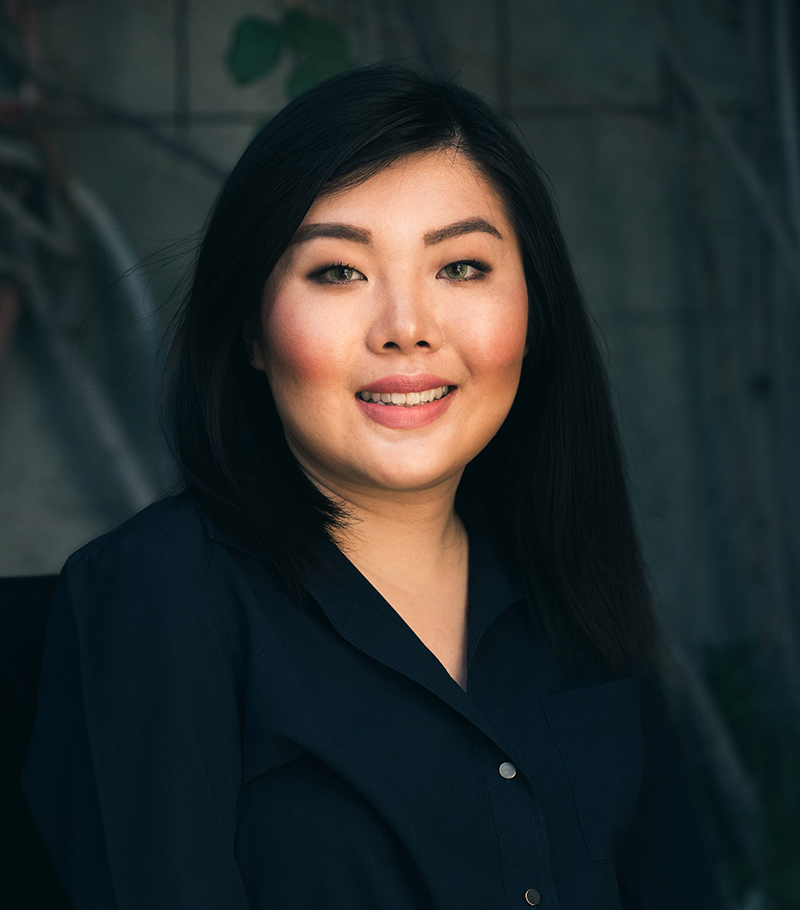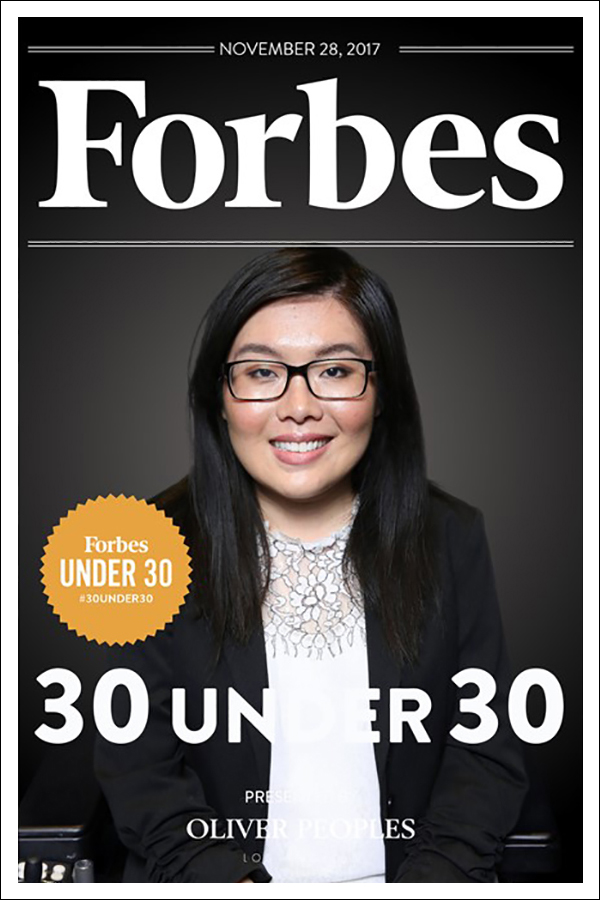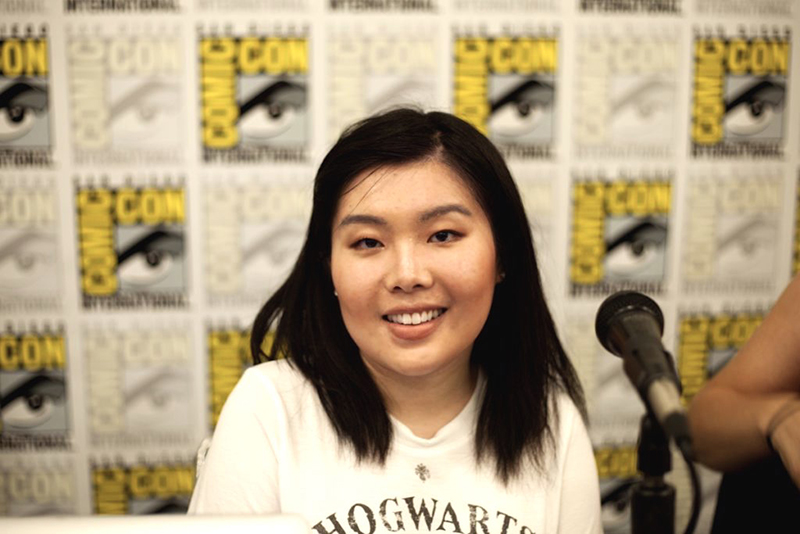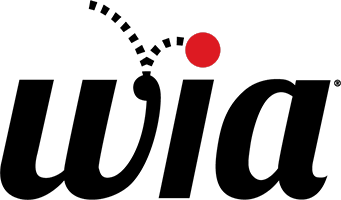SPOTLIGHT STORIES: KAITLYN YANG
Interview conducted by Tracey Miller-Zarneke
Kaitlyn Yang emigrated to the United States at the age of nine, and before the age of thirty she had graduated from USC’s film school, founded her own post-production company, (Alpha Studios in 2013) and has already accrued more than 40 visual effects credits to her name, including work on Robot Chicken, Falling Skies and The Walking Dead.
Kaitlyn took time out of her busy schedule to share her story and experience with WIA, hoping to inspire those who might face their own challenges to believe in themselves and to push themselves to follow their dream career paths…even if their parents don’t see the logic in that choice for a few decades.
When and where did your love of creating art come from?
I had to spend a lot of time in doctors’ offices when I was young because I was born with spinal muscular atrophy. At that time, not a lot of people knew what that condition was: it wasn’t really covered in a lot of medical books, and my parents were both doctors who were really serious about finding out what was wrong with their child. They might have overdone it a little bit, so most of my childhood was actually spent going from doctor appointment to doctor appointment…and my safety blanket during all that was to take a coloring book with me everywhere, or just have paper handy for sketching and drawing in between appointments—that was my earliest version of “making my own art” and it really became a vital part of my youth.
Did your parents/family encourage you in your pursuit of art as a career? If so, how? If not, how did you move forward in your pursuit?
Ha ha, I’d say they are just recently coming around to the fact that you can make art a sustainable career, once I was named as one of Forbes “30 Under 30 in Hollywood & Entertainment”. To give you more backstory, I was raised in China until I was nine and back then back there, if you were born with a physical disability, it was really hard for you to get the same level of education as those born without disabilities. Hardly any schools were built with accessibility in mind. I remember when I was little that I had to do all kinds of intelligence tests because they thought something was wrong with my brain, and that’s why I couldn’t walk. They later figured out that one had nothing to do with the other, but I was still having a hard time accessing a school that wasn’t meant for people with disabilities. So my parents moved us to the U.S. for a better life, but mainly so that I could have a chance to be educated and follow my dreams. Not to stereotype, but they really wanted me to do the doctor/lawyer/President thing as many Asian parents want for their kids.
Besides all the sketching, I had always loved reading those “making of” books in my free time to learn as much as I could. I developed a really strong work ethic at an early age, doing everything available to me to learn about what I loved. When I attended USC Film School was when my parents could finally see that I really loved doing this kind of work. I believe my parents were concerned about my career choice with the best of intentions because I think they were scared for me just getting into the entertainment industry, since they had never seen anyone on TV like me ever, at that time. They wondered how others would perceive me, and would I get overlooked for jobs because of my disability. Nowadays there is a growing movement of diversity and inclusion in Hollywood—we have Speechless and Fresh off the Boat on TV, for example—but in 1997, there was nothing like that for me to say, “look Mom, here’s this person like me” for her to understand and support my dream that wasn’t on a “tried and true” path like medicine.
For sure I’d say the final cherry on top of them accepting this as a smart career choice was the Forbes article publication. But now of course they’ve started asking, “when are you going to get married?”
Who were/are your mentors, inside or outside of animation? How have they affected you?
I had several great mentors during my time at USC. That’s one of the many strengths at USC, they are good at pairing up students with someone to bridge the gap between what is taught in a classroom or online or in books and what a job is really like in the outside world. One my mentors was Eric Hanson: I remember taking his class freshman year about learning Maya and it was such a huge undertaking for me at the time, learning this 3D program. I remember getting lost in my scene because I never really understood how to navigate a 3D space with my mouse—looking back now, that was probably a hideous question to ask him about, but back then I had to go into office hours to work it out. A few months ago, he wrote me a really touching endorsement letter for the Visual Effects Society (one of the most prestigious societies in my field) and I know I got accepted based on his letter. I really appreciate how much he has supported me along the way.
There are a couple of other people in the USC film community that have supported me as well. One was Jason Scott who worked for a long time at Rhythm & Hues: in hindsight, I can imagine how busy his schedule was, but whenever I had questions and would write him an email, he would always write me back to give me tips and tricks. And there was Pooya Ghobadpour, an alumni who worked at Sony for a long time: I could call him whenever I felt uncomfortable navigating contracts and whatnot and he was always so nice. I really appreciate the work of Torrie Rosenzweig, one of the many liaisons of the film school who connected me to alumni who are directors, producers and VFX supervisors which have really helped me and my company make connections.
Have you ever served as a mentor? If so, how has being on that side of the equation helped you?
I really believe you should give back to your community the second you can, to keep the cycle flowing, and I am enjoying being a mentor to Katherine, who I met through the Emmy Foundation. Back in 2010, I received a prestigious internship through the Emmy Foundation in the visual effects program and I got to work on The Walking Dead which opened many doors for me. I’ve been in touch with the organization ever since and at one of the mixers, I met Katherine and she reminded me a lot of myself when I was starting out. We get together once in a while and she lets me know where she is in her career and I’m there to answer any questions she has, plus I make introductions for her like what others did for me back in the day. I can’t wait for WIA to restart its mentor program so that I can participate in that as well!
Why is an organization like Women in Animation important?
This is my 10th year working in VFX and I can honestly say I have probably only worked with less than a dozen female artists during this time. I expect that number to change in the upcoming year based on all the signs pointing that way, but I think it’s largely due in part to organizations like Women in Animation and Women in Film: we’re more powerful in numbers, and I really like how these organizations can provide a platform for women to meet other people and to move their careers forward.
What advantages are there to having a diverse workforce when producing animation?
Since I am now the main person doing hiring in my own studio, I really push myself to openly hire as diverse a workforce as possible. Women bring a different set of strengths to the work, and I think it’s important to really try to balance the team. I’ve worked in many scenarios in visual effects where I am the only woman in a room of 200 artists and that can be really intimidating for me to speak and voice my opinion. I was definitely an anomaly in a lot of the shops that I’ve worked at, and I don’t want others to feel that way. It is very sad to me that in this industry that it’s often “a book being judged by its cover,” and I hope we can be an example of how you can have a diverse team and still create a beautiful project.
What, if any, adversities have you faced in your career or life in general, and how did they shape the leader you are today?
When I first started my company, and with my disability, me being Chinese and me being a woman, those things kind of worked as a double-edged sword. When I was a freelancer, I was seen as a bonus to have that diversity on their staff, but when I was doing my own thing, they would say “oh, congratulations, that’s nice,” but I felt that no one was taking me seriously just because I would come into a board room in a wheelchair. There were incidents when we would set up an initial meeting and I would casually look up the address on Google Maps or call them to see if it was wheelchair accessible. A couple of months ago I was set to meet at a café and it was not accessible, so I called them back and explained the situation and offered an alternate solution that was right around the corner from where we were going to meet anyway, and had all the amenities that we needed to just sit down and talk. Who they thought I was on paper was not who they were expecting in person. We still have a ways to go on that. My mentors have really helped me navigate some of those issues and I really appreciate that.
Was founding Alpha Studios ever a particular challenge because of the fact that you were female, or young, or any other personal factors? If so, how, and how did you overcome such a challenge?
One of my mentors, Tari Hartman-Squire—has a communications company that focuses on inclusion and diversity, which is kind of perfect for me. Recently she asked me that question—which of those three characteristics (Disabled, Chinese-American, Woman) do you think is the biggest hindrance in moving forward, and I really thought about it for a while—I said I think it’s being a woman in this business because you are always fighting in an uphill battle in a lot of areas. And I think even to this day, when I show up to a meeting as a supervisor, and even though I have a badge on the backlot, a lot of times when I come on set the first question I would get is “who are you here visiting?” Even at the Forbes event when I was checking in, some of the other people who made the list were given little press bags, they didn’t even think to give me one because they didn’t think I was on the list myself. It’s an everyday kind of thing, but I think that‘s going to change with time. The more of us empowered and the more of us in number makes it an “our” situation.
What about your age?
A lot of times, I’m the youngest person on a crew. When I got my first job in VFX, that fact was a very surprising aspect to me, and to a lot of my coworkers. It’s a different dynamic at that time in life: they’d have to leave work to go back to their families or to their kid’s band concerts, whereas I could just go out to a bar after work in my early twenties. As I have just turned 30, I feel like I’ve cast off a bit of my personal life because my work takes up such a big chunk of my time. I, like many people, got into visual effects because I saw Star Wars, and that was one of the coolest things I’d ever seen, and then a few years later I saw Harry Potter and I was like “oh my goodness, how do they make that?” I think because I figured out what I wanted to do at such a young age, it’s pushed me forward to get there early—I set those “five year goals” early, and have already hit that mark. Now that I have found a vision of where my career can go, this is the time that I have to play catch up with my personal life a bit—volunteering, giving back, finding all that life has to offer besides work.
What advice do you have for young people looking at animation or other artistic industries as their career field?
Always stay true to yourself, and always challenge yourself in any way you can. If you find yourself in a situation where you feel comfortable–if you’ve got that 9-5 locked down, in a good little spot–figure out what you can do to use that opportunity to add other skills to your toolbox. Or if you find yourself looking for that next position, learn and create, don’t stop creating. Even if people don’t know my face and my story, it’s all in footage, in my portfolio–my work speaks for itself. I don’t want people looking at me as the poster for this or that, I just want to be known for the work I do.
Always set the bar the highest for yourself, be diligent, be persistent in learning everything you can. Keep creating and eventually you will be really good so that people can’t ignore you. When I was starting out as a freelancer, I was very intimidated to go into HR or one of the VFX producers knowing I was up against eight people. I told myself ‘if today didn’t go the way I wanted it, go home and see what tutorial I could watch or take what they said that I could do to make tomorrow better.’ I always ask ‘How do I raise the bar for myself each time, project to project?’
I believe that we in entertainment serve to help people in a different way than my parents would, who take care of people from their medical talent. I know when I feel down, I have my go-to, feel-good movies to watch, so that’s how the work we do can help others.
What do you believe will encourage women to enter the creative field and seek to become leaders such industry?
Network and find your tribe. When I felt like I was lacking in some area, I’d ask other people for support—that was something new to me, even asking for help. Knowing I didn’t have the answer for something, I had to learn how to ask for help, and sometimes you have to go even outside of your tribe if you can’t find it within. Now with the Weinstein situation in Hollywood, and having worked with many directors that have made me feel uncomfortable, I say trust your gut, have a support system, and know that you will make it one day, don’t give up.
If I were to look back at how we came to the US in 1997 with everything we owned in a few suitcases, to think that one day I would own a company in Hollywood…it’s nothing I could have foreseen at all. But looking back, I knew I was doing everything to line up all my ducks in a row from a very young age, but it meant hard work through all the classes, always pushing myself and having great professors to push me, and having others there to support me to move forward.
How do you keep your artistic spirit refreshed, even when under the pressure of production deadlines or life challenges?
I have two dogs (Chihuahua and Maltese); they are my little bundles of joy and I enjoy spending time with them, going to parts of LA with them to see different neighborhoods or down to the beach. I bring them to the office, as does one of my other artists, and I think they make for a better work environment. I also enjoy playing guitar, learning to play new music, just jamming out.
I try to make our office feel a little more like home, not as corporate because I think that helps bring your own creativity out. We rent space from this lovely group called the Muse Room and they put their own unique spin on co-working spaces—all these Old Victorian decorations along with all our computers, none of that gray wall with florescent lighting from above kind of thing. I spend way more time at work than I do in my apartment. We used to have a more traditional post-production office space, computers and blank walls—but this is bursting with history and color and wood and big posters of London that puts you in a different mindset. I really enjoy coming to work everyday, and I think having a creative space makes a big difference with the kind of work we do. Everyone who comes into our space really likes it.
Any other thoughts or advice you wish to share with our membership?
One of my favorite quotes from Gina Rodriguez is “Head down, prayers up, do work” and it does work. You have to put in time, you have to do all the work and you may feel like you’re not going anywhere from time to time, but you really have to continue to challenge yourself and surround yourself with good people. If you don’t put out positive energy, it won’t come back to you.
WIA wishes Kaitlyn a warm (and recent) welcome to her 30s and we look forward to watching her enjoy a wonderful and lengthy career.



